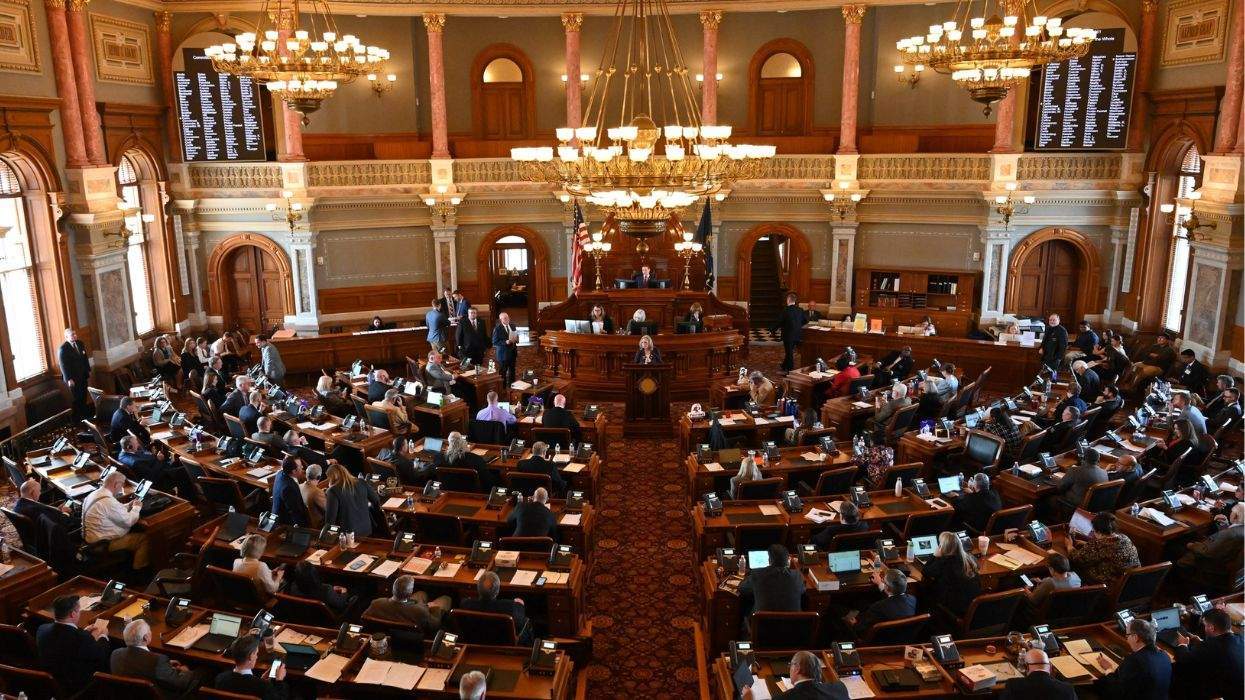Kymisha Dupree had been pleading with her husband, Michael Euring, for a new baby. She already had two wonderful boys from before the two of them were married, but she had her heart set on a little girl. HIV be damned!
Dupree, who lives in West Hollywood, Calif., and makes a living from speaking engagements about HIV, has never known life without the virus. Born prematurely in 1982, she was infected through a blood transfusion. After successfully giving birth to two of her own babies -- who at 3 and 9 years old are both HIV-negative -- she was an old hand at the medical protocol to prevent transmission to her unborn child by the time she started talking about parenthood with her new husband.
But Euring resisted. At 38, he also already had children, two sons, both born when he was in his late teens, and he wasn't so sure about starting the process over again. Plus, this would be his first child since he'd tested HIV-positive a few years before.
"When you think about the future of the child, I was a little apprehensive," Euring says, recalling his anxiety about both the risk of passing along the virus to the new baby and his own prospects for keeping healthy throughout the child's upbringing. "But my wife wanted a little girl," he says of his decision to agree to her wishes. "I wanted the things that were going to make her happy."
Dupree got her wish in August. And when Euring got to hold their daughter, Naysa Symone Dupree-Euring, he says he was overwhelmed: "You don't recognize the potential of a child until you actually hold her in your hands."
Now he says he wants another son, and it's his wife this time who isn't so sure.
The Times, They Are A-Changin'
For the first decade or so of the AIDS epidemic, the prospect of parenthood was fairly bleak for HIVers. Not only were their own life expectancies short, but an HIV-positive woman's chance of infecting her baby with the virus was as high as 25% to 40%. In 1991 the number of infants born with HIV in the United States peaked at almost 2,000. Then, thanks to dramatic improvements in prevention protocol as well as vastly improved anti-HIV therapies, that figure took a nosedive.
Today, of the estimated 120,000 to 160,000 women living with HIV in the United States, according to the Centers for Disease Control and Prevention, about 6,000 to 7,000 give birth each year. The great news is that annually only about 150 of the newborns are infected with HIV, and that figure continues to drop. According to specialists at St. Vincent's Comprehensive HIV Center in New York City, optimal medical care can reduce the chance of mother-to-child transmission to less than 1%. That's backed up by a study reported in the May 11, 2008, issue of the journal AIDS. In the study researchers analyzed medical data from more than 5,100 pregnant HIV-positive women in the United Kingdom and Ireland and found that by 2005 the rate of mother-to-child transmission was just 0.8% due to successful prenatal HIV antibody testing and treatment of women found to be HIV-positive.
"We've changed from hopelessness to hope," says Evelyn Harrington, a social worker at St. Vincent's who's been working with HIVers since the inception of the epidemic.
Boosting that shift in mind-set, an Ohio State University study published in the journal AIDS and Behavior in early 2008 found that a quarter of HIV-positive women have hopes for motherhood. And the women who were younger than 30 when they tested positive were almost four times more likely than older women to say they wanted to become pregnant.
"We shouldn't assume that women aren't going to become pregnant -- or don't want to become pregnant -- now that they have HIV. That's an erroneous assumption," says study coauthor Julianne Serovich, professor and chair of human development and family science at Ohio State. "Clinicians should be routinely discussing pregnancy with HIV-positive women of childbearing age."
Getting on the Bandwagon
For women less experienced than Dupree at navigating life -- and new life -- with the virus, the prospect of pregnancy can seem daunting in the least. However, for many, the promise of childbirth means a very symbolic repossession of the hopes and dreams they once thought were lost.
Jennifer, a single, 37-year-old attorney living in Manhattan who preferred to use only her first name because she doesn't want to potentially disclose her serostatus to coworkers, had a CD4 count of 16 when she was diagnosed with HIV in 2003. She was just finishing law school at the time, but instead of jumping right into a career like her classmates, she was so sick she couldn't work.
"I thought, Oh, my God! I'll never have kids," she says. "When I found out I had HIV, that was the very first thing that I really thought of. That broke my heart."
After a couple of years of dire health and terrible reactions to her antiretrovirals, Jennifer gradually got her strength back and eventually jump-started her stalled career. Meanwhile, she turned her lawyer's zeal toward investigating a potential pregnancy. She hit the books, sifting through thousands of pages of medical research.
"I'm educated, meticulous, and careful," she says. "So the idea that it can be done -- that's just not sufficient for me. I needed to know the actual risk before I decided whether I would be willing to take that risk. Honestly, even a 1% chance would probably not have been acceptable to me."
Her fact finding led her to the U.K.-Ireland study, in which she learned that among expectant mothers who maintained an undetectable viral load during the two weeks prior to labor, their chance of having an HIV-positive child was one in 1,000.
Finally confident that she'd be able to raise her child to adulthood, she went ahead and got pregnant -- "the usual way," she says rather coyly.
"Anytime you have a baby," Jennifer points out, "there's no guarantee on anything. So the chance that my child was going to have HIV was much lower than they would have any birth defect."
Her daughter, free of the virus, just celebrated her second birthday with a small cake-cutting party at home.
When asked how feels to now be a mom, Jennifer's sometimes reserved voice absolutely gushes: "Oh, my goodness! Motherhood is wonderful! There's a sense of awe every time my daughter learns something new or unexpected and over the funny things that she does."
And Baby Makes Three
Matt moved halfway across the country a few years ago in search of love. He'd met a fellow HIVer online and transplanted his life to Orlando, Fla., so he could be with her. There was a problem, though. He wanted kids, and she didn't. So after four years together, they went their separate ways. But 29-year-old Matt found another seropositive woman, four years his junior, who was as gung ho as he to be a parent. They got married and pregnant lickety-split.
After his son was born in October, Matt, who has an old-fashioned wide-eyed innocence about him -- frequently dropping Norman Rockwell-era phrases like "Oh, boy!" -- describes having an almost religious epiphany. "I had a feeling of elation and joy and worry, and I felt overprotective instantly," he says. "It's just like everything about me changed over the course of just a few seconds."
Matt, who works in a steel center, is intensely guarded about sharing news of his serostatus, including using his full name for this article, and he says he feels the full weight of society's stigma on his shoulders. He tends to close himself off from people, unwilling to trust them, since a series of scarring experiences in his old hometown after he disclosed that he had the virus.
Creating a family, though, has created a new safe haven for him, he says, and it's given him a sense of purpose and determination as well. With a child to support, he's planning on paying off his car loan and improving his credit with the hope of buying a house in a few years.
"It feels like I've got something real here, something that I know will always be here for me," he says about his family. "I do plan to get on meds, specifically for my son. I don't see any reason why I'm not going to live just as long as anyone."
Dupree, for one, is living proof of the miracle cycle of life: 26 years with the virus and going strong. "Don't think that you can't have a child,' she says to HIVers who are weighing their options. "Because you can. It's possible. I'm proof of it. I've got three beautiful kids who are healthy and just great. It's part of being a woman. It can happen."















